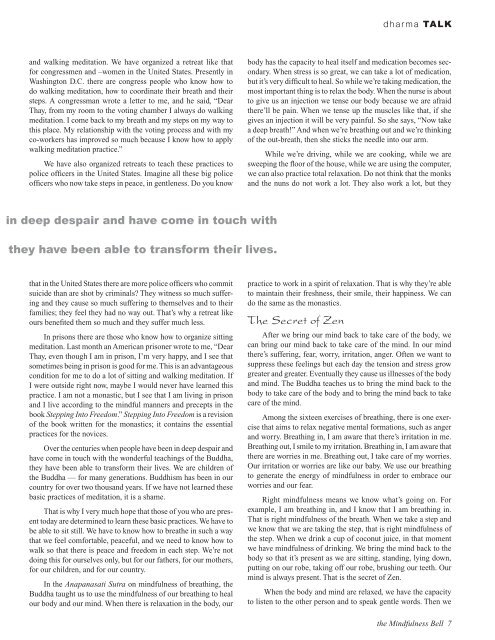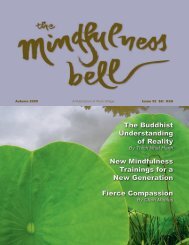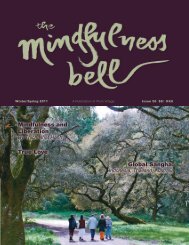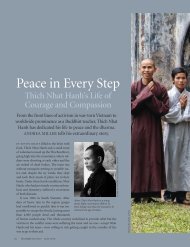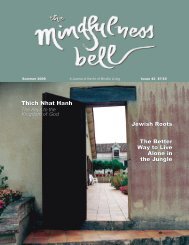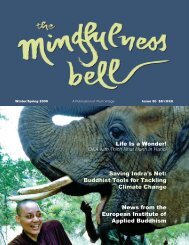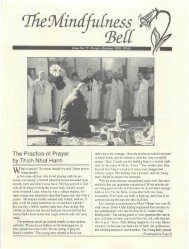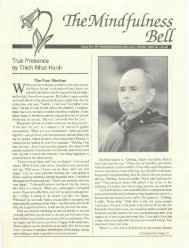Thich Nhat Hanh Healing in Vietnam The Wonderful World of Gathas
Thich Nhat Hanh Healing in Vietnam The Wonderful World of Gathas
Thich Nhat Hanh Healing in Vietnam The Wonderful World of Gathas
- No tags were found...
Create successful ePaper yourself
Turn your PDF publications into a flip-book with our unique Google optimized e-Paper software.
dharma TALKand walk<strong>in</strong>g meditation. We have organized a retreat like thatfor congressmen and –women <strong>in</strong> the United States. Presently <strong>in</strong>Wash<strong>in</strong>gton D.C. there are congress people who know how todo walk<strong>in</strong>g meditation, how to coord<strong>in</strong>ate their breath and theirsteps. A congressman wrote a letter to me, and he said, “DearThay, from my room to the vot<strong>in</strong>g chamber I always do walk<strong>in</strong>gmeditation. I come back to my breath and my steps on my way tothis place. My relationship with the vot<strong>in</strong>g process and with myco-workers has improved so much because I know how to applywalk<strong>in</strong>g meditation practice.”We have also organized retreats to teach these practices topolice <strong>of</strong>ficers <strong>in</strong> the United States. Imag<strong>in</strong>e all these big police<strong>of</strong>ficers who now take steps <strong>in</strong> peace, <strong>in</strong> gentleness. Do you knowbody has the capacity to heal itself and medication becomes secondary.When stress is so great, we can take a lot <strong>of</strong> medication,but it’s very difficult to heal. So while we’re tak<strong>in</strong>g medication, themost important th<strong>in</strong>g is to relax the body. When the nurse is aboutto give us an <strong>in</strong>jection we tense our body because we are afraidthere’ll be pa<strong>in</strong>. When we tense up the muscles like that, if shegives an <strong>in</strong>jection it will be very pa<strong>in</strong>ful. So she says, “Now takea deep breath!” And when we’re breath<strong>in</strong>g out and we’re th<strong>in</strong>k<strong>in</strong>g<strong>of</strong> the out-breath, then she sticks the needle <strong>in</strong>to our arm.While we’re driv<strong>in</strong>g, while we are cook<strong>in</strong>g, while we aresweep<strong>in</strong>g the floor <strong>of</strong> the house, while we are us<strong>in</strong>g the computer,we can also practice total relaxation. Do not th<strong>in</strong>k that the monksand the nuns do not work a lot. <strong>The</strong>y also work a lot, but they<strong>in</strong> deep despair and have come <strong>in</strong> touch withthey have been able to transform their lives.that <strong>in</strong> the United States there are more police <strong>of</strong>ficers who commitsuicide than are shot by crim<strong>in</strong>als? <strong>The</strong>y witness so much suffer<strong>in</strong>gand they cause so much suffer<strong>in</strong>g to themselves and to theirfamilies; they feel they had no way out. That’s why a retreat likeours benefited them so much and they suffer much less.In prisons there are those who know how to organize sitt<strong>in</strong>gmeditation. Last month an American prisoner wrote to me, “DearThay, even though I am <strong>in</strong> prison, I’m very happy, and I see thatsometimes be<strong>in</strong>g <strong>in</strong> prison is good for me. This is an advantageouscondition for me to do a lot <strong>of</strong> sitt<strong>in</strong>g and walk<strong>in</strong>g meditation. IfI were outside right now, maybe I would never have learned thispractice. I am not a monastic, but I see that I am liv<strong>in</strong>g <strong>in</strong> prisonand I live accord<strong>in</strong>g to the m<strong>in</strong>dful manners and precepts <strong>in</strong> thebook Stepp<strong>in</strong>g Into Freedom.” Stepp<strong>in</strong>g Into Freedom is a revision<strong>of</strong> the book written for the monastics; it conta<strong>in</strong>s the essentialpractices for the novices.Over the centuries when people have been <strong>in</strong> deep despair andhave come <strong>in</strong> touch with the wonderful teach<strong>in</strong>gs <strong>of</strong> the Buddha,they have been able to transform their lives. We are children <strong>of</strong>the Buddha — for many generations. Buddhism has been <strong>in</strong> ourcountry for over two thousand years. If we have not learned thesebasic practices <strong>of</strong> meditation, it is a shame.That is why I very much hope that those <strong>of</strong> you who are presenttoday are determ<strong>in</strong>ed to learn these basic practices. We have tobe able to sit still. We have to know how to breathe <strong>in</strong> such a waythat we feel comfortable, peaceful, and we need to know how towalk so that there is peace and freedom <strong>in</strong> each step. We’re notdo<strong>in</strong>g this for ourselves only, but for our fathers, for our mothers,for our children, and for our country.In the Anapanasati Sutra on m<strong>in</strong>dfulness <strong>of</strong> breath<strong>in</strong>g, theBuddha taught us to use the m<strong>in</strong>dfulness <strong>of</strong> our breath<strong>in</strong>g to healour body and our m<strong>in</strong>d. When there is relaxation <strong>in</strong> the body, ourpractice to work <strong>in</strong> a spirit <strong>of</strong> relaxation. That is why they’re ableto ma<strong>in</strong>ta<strong>in</strong> their freshness, their smile, their happ<strong>in</strong>ess. We cando the same as the monastics.<strong>The</strong> Secret <strong>of</strong> ZenAfter we br<strong>in</strong>g our m<strong>in</strong>d back to take care <strong>of</strong> the body, wecan br<strong>in</strong>g our m<strong>in</strong>d back to take care <strong>of</strong> the m<strong>in</strong>d. In our m<strong>in</strong>dthere’s suffer<strong>in</strong>g, fear, worry, irritation, anger. Often we want tosuppress these feel<strong>in</strong>gs but each day the tension and stress growgreater and greater. Eventually they cause us illnesses <strong>of</strong> the bodyand m<strong>in</strong>d. <strong>The</strong> Buddha teaches us to br<strong>in</strong>g the m<strong>in</strong>d back to thebody to take care <strong>of</strong> the body and to br<strong>in</strong>g the m<strong>in</strong>d back to takecare <strong>of</strong> the m<strong>in</strong>d.Among the sixteen exercises <strong>of</strong> breath<strong>in</strong>g, there is one exercisethat aims to relax negative mental formations, such as angerand worry. Breath<strong>in</strong>g <strong>in</strong>, I am aware that there’s irritation <strong>in</strong> me.Breath<strong>in</strong>g out, I smile to my irritation. Breath<strong>in</strong>g <strong>in</strong>, I am aware thatthere are worries <strong>in</strong> me. Breath<strong>in</strong>g out, I take care <strong>of</strong> my worries.Our irritation or worries are like our baby. We use our breath<strong>in</strong>gto generate the energy <strong>of</strong> m<strong>in</strong>dfulness <strong>in</strong> order to embrace ourworries and our fear.Right m<strong>in</strong>dfulness means we know what’s go<strong>in</strong>g on. Forexample, I am breath<strong>in</strong>g <strong>in</strong>, and I know that I am breath<strong>in</strong>g <strong>in</strong>.That is right m<strong>in</strong>dfulness <strong>of</strong> the breath. When we take a step andwe know that we are tak<strong>in</strong>g the step, that is right m<strong>in</strong>dfulness <strong>of</strong>the step. When we dr<strong>in</strong>k a cup <strong>of</strong> coconut juice, <strong>in</strong> that momentwe have m<strong>in</strong>dfulness <strong>of</strong> dr<strong>in</strong>k<strong>in</strong>g. We br<strong>in</strong>g the m<strong>in</strong>d back to thebody so that it’s present as we are sitt<strong>in</strong>g, stand<strong>in</strong>g, ly<strong>in</strong>g down,putt<strong>in</strong>g on our robe, tak<strong>in</strong>g <strong>of</strong>f our robe, brush<strong>in</strong>g our teeth. Ourm<strong>in</strong>d is always present. That is the secret <strong>of</strong> Zen.When the body and m<strong>in</strong>d are relaxed, we have the capacityto listen to the other person and to speak gentle words. <strong>The</strong>n wethe M<strong>in</strong>dfulness Bell 7


